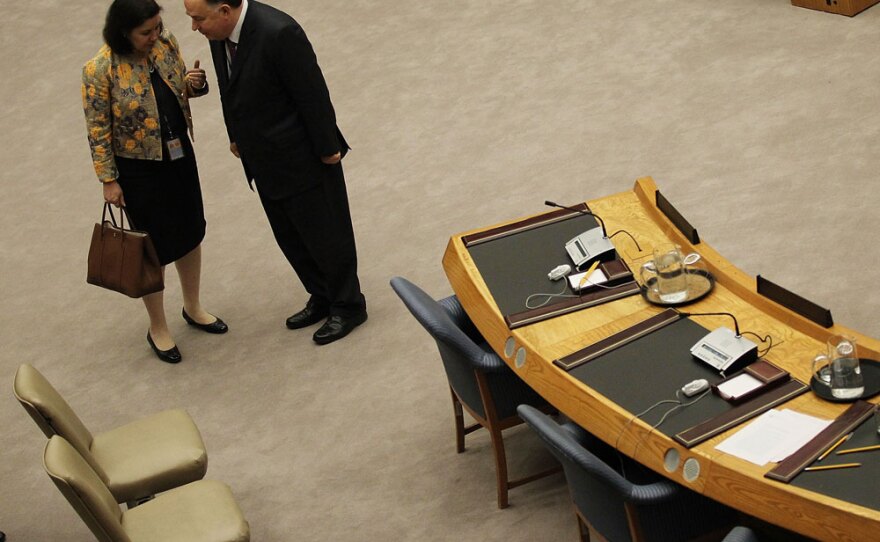The U.S. and European Union are moving to tighten the financial noose around Iran to pressure it to curb its nuclear ambitions. They are calling on all countries -- including those that voted against sanctions in the U.N. Security Council earlier this month -- to do the same.
One of those no votes came from Turkey, which disapproves of what it calls "coercive diplomacy." Turkey says it is working behind the scenes, with U.S. encouragement, to keep diplomatic options alive in relations between Iran and the West.
Ibrahim Kalin, an adviser to Turkish Prime Minister Recep Tayyip Erdogan, says his country agrees with the U.S. and Europe on the ultimate goal -- to prevent Iran from having a nuclear bomb.
"We don't disagree in substance; we disagree in style," he told reporters at the Turkish Embassy in Washington this week.
In a statement read at Friday prayers in Iran, the country's Supreme National Security Council called the U.N. sanctions "illegal."
We are encouraging Turkey to continue to tell Iran that there is an opportunity for diplomacy and dialogue and we will see how Iran responds.
The U.S. says it will vigorously apply the sanctions, which include an expanded arms embargo. The United States and its allies are concerned that Iran's nuclear program, which includes uranium enrichment, could ultimately produce a nuclear weapon.
The Iranian council's statement said those were "trumped-up charges that have never been proven." Iran claims its nuclear program is for peaceful purposes to produce energy and further medical research.
Turkey, a member of NATO, has been broadly criticized in Washington for not supporting the U.S. on the issue of sanctions and for its verbal attacks on Israel over Israel's blockade of Palestinians in the Gaza Strip.
Sen. John McCain (R-AZ) says Turkey's embrace of Iran will not help regional peace and threatens Turkey's legacy as a secular nation. "The rhetoric [Erdogan] is using concerning Israel and the obvious thumb in the eye that Turkey and Brazil orchestrated with this feckless agreement on enriched material is an indication that Turkey continues at a crossroad," McCain said at a news conference.
What McCain calls a feckless agreement, Turkish officials see as a starting point for a diplomatic way out of the dispute over Iran's suspect nuclear program.
Iran agreed under a plan negotiated by Brazil and Turkey to send 1,200 kilograms of low-enriched uranium abroad in return for fuel for its Tehran Research Reactor.
The deal was similar to a confidence-building proposal that the U.S. and other major powers made last October. Still, the U.S. and its allies went ahead with U.N. sanctions because the research reactor deal did not account for the fact that Iran continued to enrich uranium to a higher grade in violation of previous resolutions.
Kalin, who was in Washington with lawmakers from Turkey's ruling AK party, says his country wants to see Iran go ahead with the fuel swap.
He says Iranians "can easily say we are out of this deal" and "there is no use in talking to the Americans" after the sanctions. However, Kalin says Turkey is encouraging Iran to stay at the table, and "that is a message we are getting from the U.S. administration also."
State Department spokesman P.J. Crowley says the Tehran research reactor deal "has to be adjusted" to reflect Iranian activity over the past nine months. He says Iran has nearly doubled its enriched uranium supply.
If the fuel-swap deal is improved, it could be a step toward the broader discussions that the U.S. and its partners are seeking, Crowley says, pointing out that this is where Turkey might fit in.
"We are encouraging Turkey to continue to tell Iran that there is an opportunity for diplomacy and dialogue and we will see how Iran responds," he says.
Copyright 2022 NPR. To see more, visit https://www.npr.org. 9(MDAzMjM2NDYzMDEyMzc1Njk5NjAxNzY3OQ001))







